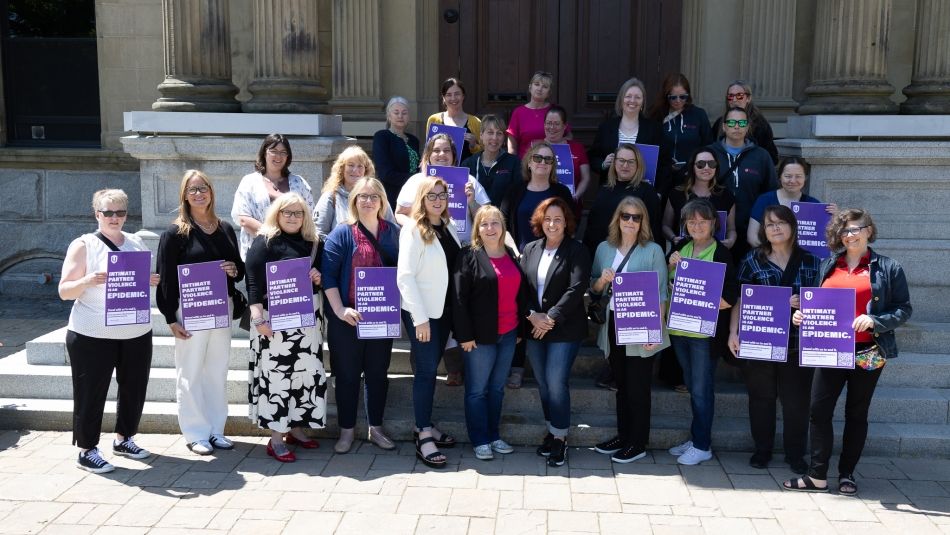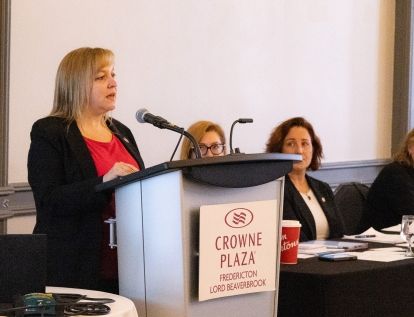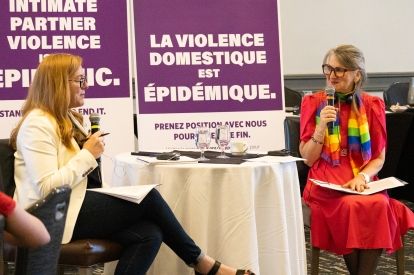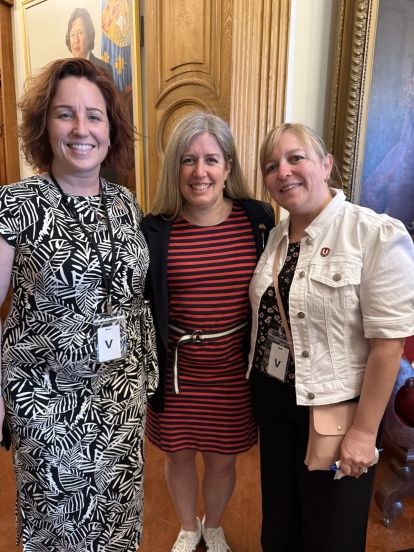
Share
A one-day symposium in Fredericton, N.B. gathered Unifor members and leaders with organizations who provide frontline services and supports for people across the province experiencing, fleeing, and recovering from Intimate Partner Violence (IPV).
Atlantic Regional Director Jennifer Murray welcomed attendees and talked about the union’s Women’s Advocates, workplace representatives trained to listen and to connect members with community supports and services.
“We’ve heard stories from women who have felt supported through their Women’s Advocate to seek help leaving abusive relationships, and it’s through these Advocates that we heard about the worsening crisis happening across this country,” said Murray. “With a concerning increase in the number of workers reaching out for support to escape violence, we knew as a union that we needed to do more.”
Murray shared the union’s advocacy work in Nova Scotia last fall that led to the unanimous passing of legislation that declared IPV an epidemic in the province. The union is advocating for governments in every province to formally recognize the epidemic of violence as a way to unlock funding, education, and a full-community approach to prevention and healing.
Days prior to the Symposium, a motion was tabled in the New Brunswick Legislature to declare IPV an epidemic.
N.B. Minister of Women’s Equality Lyne Chantal Boudreau spoke at the Symposium and offered her thoughts on the motion and her personal experiences as a survivor and as an educator who had supported other survivors.
Minister Boudreau spoke with Unifor Women’s Director Tracey Ramsey about the union and frontline service providers’ call to recognize the IPV epidemic and acknowledged the work ahead in increasing capacity to services beyond what is required in the immediate term.
“Our government knows that we have to be ready to accept and support more people and that our services must be ready once we do more education about this kind of violence,” said Boudreau. “Education brings awareness, and with that awareness, more people will identify that they are victims. So, we must be ready to increase capacity across many public and community services.”
Following a meaningful exchange of questions and reflections with Minister Boudreau, Symposium delegates marched across the street to the steps of the New Brunswick Legislature to show the union’s support for the motion.
The afternoon session provided Unifor members the opportunity to hear directly from frontline service providers in their communities and the incredible work being done and that needs greater support.
Alyson Pizzey is the Executive Director of Liberty Lane, an organization that offers second-stage housing to women and children feeling violence.
“I help women look at their social thinking, their emotional regulation and resiliency. We have a kids club and a program where we can help moms and children to navigate that abuse between them and help strengthen that relationship. And we’ve started a healthy relationships program for teens,” said Pizzey.
Heather Murchland, Executive Director of the Gignoo Transition House, shared her organization’s support offerings and the important cultural context in which they offer care.
“At Gignoo we provide a safe place for Indigenous women fleeing violence,” said Murchland. “We offer traditional healing through our cultural program, and we have crafting, and elders who provide teaching. We value the knowledge of our sacred elders.”
Emily Essensa is a Sexual Assault Nurse Examiner (SANE) at Horizon New Brunswick where she provides immediate medical care for victims of violence, elder abuse, child abuse, and trafficking.
“We do a full strangulation assessment, and it’s sad that we need to have a strangulation protocol but it’s important,” said Essensa, explaining that strangulation is a key indicator of future homicide. “We assist with locating emergency shelter at our transition homes and it’s a scary feeling when they’re full and you’re calling all around the province and they’re at or above capacity.”
Public Legal Education and Information Service of New Brunswick Community Project Manager Chenise Norrad delivered a presentation on her work, available by request across the province, to connect people with the information they need about legal processes and how to navigate the complex processes involved in protection orders, family law, courts and tribunals.
Guest speaker Sarah Sherman, founder of We’re Here for You Canada, showed a short CBC documentary of her story of IPV that inspired her to start her own charity that assembles care kits for those who may otherwise leave a hospital without their clothing and shoes that are often confiscated as evidence.
“I wanted to offer dignity in a moment of incredible vulnerability,” said Sherman.
The session closed with 30 minutes of breathwork to help delegates regulate and re-centre after heavy conversations and a day of intense work.
“The Symposium was hugely successful at bringing together activists and service providers and helping us to support each other’s work. We are allies in the fight to end IPV,” said Unifor Women’s Director Tracey Ramsey. “ARC Women’s Committee member Erin MacDonald did excellent work to help us bring the service providers and union members together and I have strong hope for the work we’ll do next in New Brunswick.”
As the New Brunswick legislative sitting continued in the days following the Symposium, MacDonald and Murray returned to the steps of the Legislature to mark the motion to declare IPV an epidemic passing unanimously.
“We can accomplish great things when we put our hearts and minds together and show up ready to put in the work,” said Murray.
Read more about Unifor’s call for every province to declare Intimate Partner Violence an epidemic.





